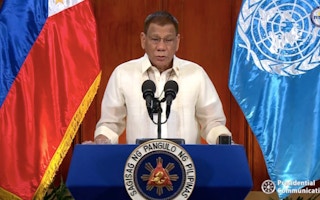The same urgency in fighting the coronavirus pandemic is needed to tackle climate change, Philippine president Rodrigo Duterte told the United Nations General Assembly on Wednesday (23 September).
To continue reading, subscribe to Eco‑Business.
There's something for everyone. We offer a range of subscription plans.
- Access our stories and receive our Insights Weekly newsletter with the free EB Member plan.
- Unlock unlimited access to our content and archive with EB Circle.
- Publish your content with EB Premium.
Speaking before the assembly for the first time, Duterte said in a video message that climate change has “worsened the ravages of the pandemic.”
“The same urgency needed to fight Covid-19 is needed to address the climate crisis. This is a global challenge that has worsened existing inequalities and vulnerabilities from within and between nations,” said the chief executive, even as his country is projected to have the highest share of coal in the power mix for Southeast Asia in 2030.
Coal is the single largest contributor to climate change, which threatens to put 400 million people in the poorest countries at risk of severe food and water shortages by 2050.
He also called on the parties of the Paris Agreement “especially those who have not made good their commitment to fight climate change” to comply with its terms as developing countries like the Philippines are the most vulnerable to climate disasters.
“
Shame on you, President Duterte, for not walking your UN climate commitments talk in your own backyard. We are on a climate strike amid the pandemic because of Duterte’s relentless pursuit of climate disruptive projects like coal power expansion, land reclamation, and aggressive big mining.
Mitzi Jonelle Tan, international spokesperson, Youth Advocates for Climate Action Philippines (YACAP)
The Philippine leader’s speech came a day before environmental watchdog Greenpeace released a new report that revealed that the country will not be able to reach its commitment to keep global temperature rise to below 1.5 degrees Celsius, with the department of energy’s current draft of the Philippine Energy Plan.
The study titled Southeast Asia Power Sector Scorecard said although the Philippines was an early leader on renewable energy after the introduction of the renewable energy act in 2008, subsequent years have seen the share of coal in the energy mix rise to 52 per cent.
“President Duterte has called for urgent action to the climate crisis but it seems that this has fallen on deaf ears in the department of energy, whose lackluster approach to renewable energy and support for coal is preventing us from fulfilling our 1.5-degree commitment,” said Khevin Yu, campaigner for Greenpeace Philippines.
Meanwhile, Filipino climate strikers said the same speech failed to show commitment in addressing the worsening climate, ecological, and humanitarian crises experienced locally by Filipinos.
“Shame on you, President Duterte, for not walking your UN climate commitments talk in your own backyard. We are on a climate strike amid the pandemic because of Duterte’s relentless pursuit of climate disruptive projects like coal power expansion, land reclamation, and aggressive big mining,” said Mitzi Jonelle Tan, international spokesperson of Youth Advocates for Climate Action Philippines (YACAP), the lead organiser of climate strikes in the Philippines.
“The height of hypocrisy is that Filipino climate protectors are now being terrorized under the Anti-Terrorism Act of 2020 that Duterte defended in the same speech,” Tan added.
In July, the Philippine government enacted an anti-terrorism law which, according to international human rights groups, will eliminate critical legal protections and permit government overreach against groups and individuals labelled terrorists. The law was signed by the president, despite online and street protests amid community quarantine restrictions imposed to contain the coronavirus outbreak.
Kalikasan People’s Network for the Environment, a green group and a co-organiser of the Philippine strikes, said that it has monitored at least 167 Filipino environmental defenders working in the frontlines of environmental and climate justice murdered under Duterte’s term in office.
During the Covid-19 lockdown alone, at least 557 environmental defenders suffered physical assault, illegal arrests, harassment lawsuits, and other human rights violations, it said.










